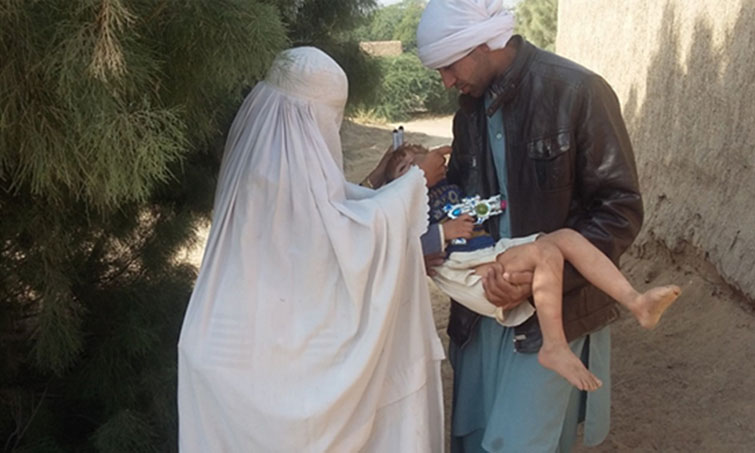
Khyber Pakhtunkhwa is one of the four provinces of Pakistan, located in the northwestern region of the country and is home to large numbers of mobile populations who are at high risk of poliovirus transmission. Reaching children on the move is critical for polio eradication in Pakistan and therefore, a number of innovative approaches are being used including engaging religious leaders and female vaccinators to ensure that every child is vaccinated.
Located 200 kilometers south from Peshawar, Bannu is a small district of Khyber Pakhtunkhwa. In past few years, it gradually became home to 90 percent of displaced persons fleeing troubled areas. To dispel polio vaccination myths which used to be widespread among conservative community in Bannu, religious scholars joined the polio eradication initiative to address religious refusals and ensure that all children are vaccinated.
Palwasha, a resident of district Bannu, was only four when she was attacked by poliovirus. “Not knowing what has happened to my leg, my parents took me to every doctor, every hospital, and even rehabilitation centers – we travelled for one month but to no avail. It was the longest and most painful time of my life,” says Palwasha.
Having lived a difficult life, Palwasha decided to stand up to the hardships and resolved to join the fight against polio. With her exceptionally good interpersonal communication skills and trust relationship with people, she became a polio vaccinator in 2015.
With new studies, evolving strategies, and best practices in the field of behavior change communication, it has been learned and pressed upon lately that interpersonal communication skills are extremely important for any behavior change. New approaches are being designed worldwide and in Pakistan to train workers and health professionals on IPC skills. Effective counseling and communication can help individuals shift from one level of intent and action to the next along the hierarchy of behavior change.
Health workers and vaccinators all over communicate with families all month long, sharing information with them and addressing their concerns,” says Imran, an area coordinator in District Bannu. “Community wants to learn about health issues, and we feel it is our responsibility as health workers to provide our people with complete information and health services.
When Palwasha was hired, there were more than 250 reported refusals in her community, which meant that more than 80% of children in the area were not being immunized against polio. Palwasha started working together with a team of health workers. She visited families every day repeatedly, at times holding conversation with families herself, at others taking support of RSPs. With continuous efforts, and hard work, the refusal rate has been brought to zero in her community. Sharing this achievement, Imran says, “It is always a combined effort of our workers and community. We are thankful to God for helping us achieve this goal. However, now that we have reached the mark of zero, our teams will have to work harder to ensure that this status is maintained overtime.
